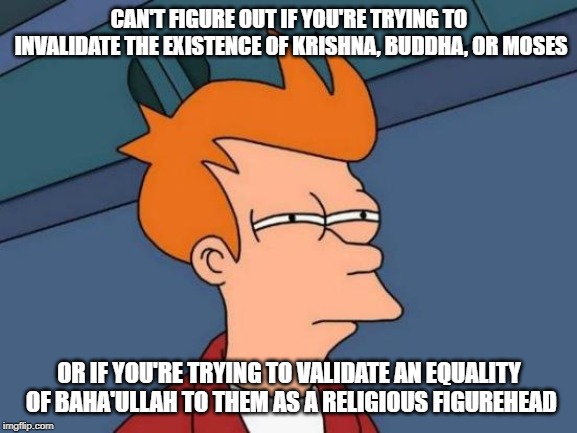InvestigateTruth
Well-Known Member
Suppose today, a group of people, come up with a new myth, and make up stories about an Incarnation of God on earth, called 'so and so'. Completely a new One!
Do you really think, people believe it? Wouldn't they question that, if indeed such a Person was on earth and claimed to be a God, how come no body in previous generations knew about Him, or said anything about Him?!
Now, let's talk about, for example if a Person by the name Krishna, did not exist. If indeed He never existed on earth, how would people have started to give away their own beliefs and replace it with a belief in Him, and His stories? Suppose a group of people had come up with a tale, and invented a Person by name of Krishna as incarnation of God. Why would even people of that time, accept that, when none of their grand parents or family or people, ever said such a thing, and all the sudden the story started?!
Now, compare that with for example Bahaullah. None would question His existence. Why? Because, our grand grand parents, or people in that generation had seen Him, and thus His news, was passed on to the next generation. But if He did not exist even, no body would have passed the news from generation to the next. Same must have been with Krishna. Right?
Do you really think, people believe it? Wouldn't they question that, if indeed such a Person was on earth and claimed to be a God, how come no body in previous generations knew about Him, or said anything about Him?!
Now, let's talk about, for example if a Person by the name Krishna, did not exist. If indeed He never existed on earth, how would people have started to give away their own beliefs and replace it with a belief in Him, and His stories? Suppose a group of people had come up with a tale, and invented a Person by name of Krishna as incarnation of God. Why would even people of that time, accept that, when none of their grand parents or family or people, ever said such a thing, and all the sudden the story started?!
Now, compare that with for example Bahaullah. None would question His existence. Why? Because, our grand grand parents, or people in that generation had seen Him, and thus His news, was passed on to the next generation. But if He did not exist even, no body would have passed the news from generation to the next. Same must have been with Krishna. Right?

